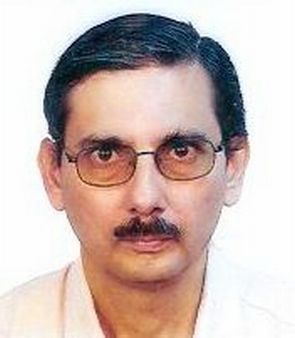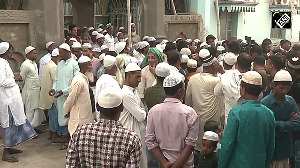'Tagore repeatedly denounced the "My country, right or wrong" attitude.'
'We often use the phrase "unity in diversity" like a cliche and often make diversity secondary, giving precedence to unity.'
'You do not have to shout from the rooftops that we are very tolerant.'

Following the arrest of Jawaharlal Nehru University Students Association President Kanhaiya Kumar on the charge of sedition, JNU Professor Ranabir Chakravarti asserted (external link) that 'If Tagore was alive, he would have been in jail.'
Professor Chakravarti, image, below, made this statement during a series of lectures that JNU has organised for students to debate the issue of nationalism.
A professor of economic history of early India and Indian Ocean maritime history at JNU, Profssor Chakravarti spoke to Syed Firdaus Ashraf/Rediff.com about nationalism and what Gurudev Tagore said on the subject.
What would Rabindranath Tagore have said if he saw the JNU row?
Had he been witness to these events, he would have been circumspect about the very narrow definition of nationalism. He would also have decried any kind of shrill calls against the government.
He would have asked those armed with differing standpoints to come before him and would have heard their voices. That would have been the most critical difference in Tagore's approach vis-a-vis this regime.
He would have listened to diverse voices and positions before arriving at a decision of his own.
During the civil disobedience movement there was a large base of close followers, teachers and students at Visva Bharati University who felt inclined to join the movement and urged Tagore to join Gandhi.
Tagore himself was not in favour of Visva Bharati joining a political movement on such a large scale. So he arranged for a debate that he presided over. All persons spoke of different views.
At the end of the debate a vote call indicated that most of the teachers and students wished to join the civil disobedience movement led by Gandhi.
Tagore got up and said something to this effect: 'I am very happy that today Visva Bharati has come of age. It can formulate its own stand as shown by a very large number of students and the teachers who do not agree with my position.'
This was Tagore.
Your speech at JNU said that Tagore was against the 'cult of nationalism.' Can you explain that?
That is best explained by a little pamphlet he wrote. He gave two lectures: First in Japan in 1916 and a second in the US in 1917 on the subject.
The essence of his political understanding of the nation was, there is always ambivalence. He was aware of what is called a nation. He was aware of the political aspect of the nation.
What the nation can stand for if political freedom is achieved by the nation, particularly in the Indian context, by removing British rule.
He wrote a proof of the concept of nation, if it could embrace the tremendous diversity, of ethnic groups, of religious beliefs, of cultural practices, of language, of regional tradition, and of differing ways of life.
If all these could be brought under an overall umbrella identity of a nation, Tagore would have had no qualms about it.
Today we are making nationalism into an almost divine article of faith. How did Tagore deal with such attitudes?
One has to go by Tagore's book Religion of Man which was published in 1933.
He was always giving greater emphasis on his faith in human beings and, by extension, in humanity.
For Tagore, human beings were far more important than the concept of a nation.
Tagore repeatedly denounced the "My country, right or wrong" attitude.
He was a great proponent of internationalism.
The years between 1900 and 1940 saw the world permeated with shallow nationalism combined with high militarism. Tagore was against such a conception of the nation.
Isn't this an overly philosophical and impractical view of the world?
This is a false charge. He was not speaking, but practising it. In 1921, Visva Bharati was actually dedicated to the nation.
He was repeatedly stating from 1908 that present day education under the colonial regime was only generating some job-holders.
They are clerks, darogas, doctors or professionals, but this is no education because the mind is almost enslaved to certain values and the mere mechanical reproduction of some schoolbook text.
If education means freedom of mind, reasoning, adaptability to different viewpoints, creativity, nothing of this was there.
Now, with Visva Bharati, what does he do? He brings in agriculture as a subject.
He sets up an agriculture wing in Visva Bharati and sends his son and son-in-law to the US to learn better technologies in agriculture.
He wanted that to be put into practice by actual villagers.
For the first time he brings in what is a rural banking system and a credit network, along with the first cooperative movement of India.
Tagore's education policy was not merely high-flying philosophy for armchair intellectuals. He was a practical realist.
 Those who do not subscribe to the Bharat Mata image are being deemed traitors these days. How does this reconcile with Tagore's views?
Those who do not subscribe to the Bharat Mata image are being deemed traitors these days. How does this reconcile with Tagore's views?
I do not believe in the image of Bharat Mata at all. Bharat Mata is an understanding of the nation that comes from a Devi, a goddess.
It appeals to particular sections of the Indian community, particularly the Hindu upper caste groups.
It may have its appeal to them. But take, for example, someone who is not a worshipper of a Devi, how will they relate to this image?
While it is a religious figure indicative of a particular sectarian approach, will it appeal to all Indians cutting across religious, linguistic and cultural diversities?
Someone may say that it is only a symbol.
However, in India, a country with remarkable diversity, this tendency towards homogenisation is a real threat. Homogenisation is dangerous and is infectious.
We often use the phrase 'unity in diversity' like a cliche and often make diversity secondary, giving precedence to unity.
What is being targeted in the name of unity and is perceived and vigorously clamped down upon, is uniformity.
Uniformity and unity are not the same concepts at all. It is like an orchestra where all the instruments are being played, but with a combined note and tune, but each instrument has a contribution and each instrument is very distinct.
In an orchestra you can very well differentiate that. That is the question.
Tagore had said 'unity through diversity', not 'unity in diversity.' The moment you say 'unity in diversity,' it is a static position.
When you say 'unity through diversity,' as he did, it is a process, it is changing. The concept of unity will be dynamic.
That is at the very heart of Tagore's understanding of human society.
Where did the concept of Bharat Mata originate?
I think the late 19th and early 20th century, and became particularly popular after Bankim Chandra's national song Vande Mataram.
It is a salutation to the mother and motherland. An iconic figure was actually painted by Abanindranath Tagore (Rabindranath Tagore's nephew), which became very popular.
It is a very famous painting, but Tagore was not always happy at Abanindranath clinging to the idea of national iconography in the form of a goddess.
Tagore was repeatedly talking of cutting off national boundaries and he was going beyond the boundary and espousing the cause of internationalism.
Can you shed some light on Tagore's views on Anandmath and Vande Mataram?
Tagore was very respectful to the creation of Vande Mataram.
He himself sang that song. He composed music for the lyrics.
But Tagore himself said the song in its entirety cannot be considered applicable to the sentiments of different cultural groups in this country.
It is particularly very appealing to the Hindu society, but India is not merely a land for a particular community.
Therefore, he chose a particular stanza of Vande Mataram to be sung.
Which is that stanza?
He chose the first stanza of Vande Matram, which was actually taken by the Constituent Assembly to be India's national song.
Jana Gana Mana was taken up as the national anthem by Dr Rajendra Prasad, the first President of India. This was approved by the Constituent Assembly.
In his book on nationalism, Tagore writes about India's spirit of tolerance. Why is there so much intolerance in Indian society today?
If Indian society has always been tolerant, then there is no need to showcase it. It will come into your daily life and daily practices.
You do not have to shout from the rooftops that we are very tolerant. Toleration means first of all that you shed the fear of the different.
When we say tolerant, we think that the status quo is the norm and we are also accepting that anything outside that space is against the norm.
This actually generates a fundamental and deep-seated fear of something different from what I perceive as the norm.
Tagore was questioning that. The basic point here is the fear of the different, and that is against cosmopolitanism.
The understanding of internationalism is based on the recognition of cosmopolitanism, not a single strand, not a homogenised position of any culture.










